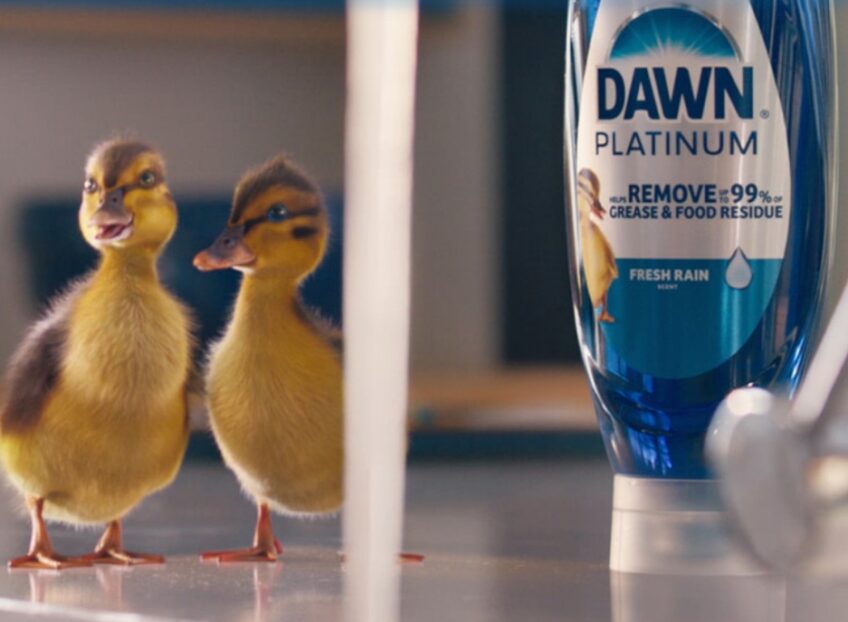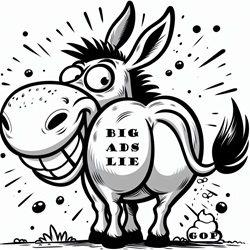The Real Reason Dawn Dish Detergent is a Big Ads Lie
March 18, 2025 | by Renegade

The name of the blog is Big Ads Lie, where we expose corporate deceit and shine a light on misleading advertising and advertising lies. Today, we’re turning the spotlight on Procter & Gamble’s flagship product, Dawn dish detergent. In its cleverly designed marketing, Dawn is touted as an eco-friendly solution that “saves” oil-spill–affected wildlife. If you’re old enough, then you’ve definitely seen at least one commercial showing volunteers cleaning wild birds covered in crude oil with Dawn dish detergent. Even today, baby ducks are plastered all over their advertising, across their website, and even on their products. But behind the feel-good imagery lies a grimmer reality.
In 2017, Dawn raked in approximately $624 million in U.S. sales, according to Statista. Yet while these impressive numbers make for a great marketing story, they also mask serious environmental and ethical issues. In the sections that follow, we’ll reveal how Dawn’s advertising manipulates your emotions, how its reliance on plastic packaging is devastating our planet, and why its true environmental impact is anything but green.
Read on to learn why Dawn’s image is built on a foundation of deception—and discover the eco-friendly alternatives you can choose instead.

Emotional Manipulation in Dawn’s Advertising
Dawn’s ads are designed to pull at your heartstrings. When you see a commercial of volunteers cleaning wild birds covered in crude oil—or baby ducks plastered across their website—your first thought is likely, “Oh, those poor animals. Good on Dawn for saving them.” You might even feel compelled to buy their products, convinced that you’re supporting an eco-friendly company. If these tactics work on you, don’t feel bad; that’s exactly what they’re meant to do. Like every corporation, Dawn spends millions to ensure its advertisements manipulate you into buying their products. Here’s why their ads are actualy all a load of crap.
The Plastic Problem
First, Dawn dish detergent—and most of their products—comes in plastic bottles. Exact sales numbers aren’t publicly disclosed, but industry estimates suggest that tens of millions of bottles are sold annually in the U.S. alone. Dawn claims on their website that their clear bottles are made from 35% post-consumer recycled plastic (Dawn Ingredients), which is a step in the right direction, but ultimately doesn’t mean much. Since most plastic can’t be recycled and recycled bottles definitely can’t be recycled again, where do you think these tens of millions of bottles end up? That’s right: in landfills, where they break down into microplastics that pollute our waterways and contribute to the Great Garbage Patch in the Pacific Ocean. Recent studies show that microplastics coat our lungs, intestines, and even enter our bloodstream—not to mention their devastating effects on wildlife. Some animals even eat plastic waste, mistaking it for food, where it gets stuck in their digestive systems and they eventually starve to death. It’s not a pleasant way to die. Ultimately, we have likely yet to see the worst of what plastic pollution will cause. So, while Dawn may have helped clean a few hundred animals affected by oil spills, the plastic waste they generate has likely killed thousands more.
The Crude Oil Connection
Secondly, remember that plastic is made from – drumroll please – crude oil. That’s right, Dawn’s plastic bottles are made using petroleum and petroleum is made from the same crude oil from those major spills that Dawn proudly claims to help clean up. When Dawn donates its products to clean oil-spill–affected animals, it isn’t an act of genuine charity; it’s merely cleaning up the mess they helped create. It is literally their responsibility to do so, not an act of altruism. If they truly cared about the environment, they’d stop using plastic or switch to biodegradable alternatives, such as plastics made from hemp or algae.
Environmental Impact of Detergent Ingredients
Third, while Dawn dish detergent is phosphate-free (a plus, since phosphates cause harmful algae blooms that suffocate aquatic life), it does contain surfactants like sodium lauryl sulfate. These surfactants are toxic to aquatic organisms and persist in the environment, accumulating in the tissues of marine animals. Remember what happened with DET? Fish consumed DET, then birds of prey consumed the fish, accumulating more and more DET in their tissues. This resulted in bald eagles—a great symbol of our nation—nearly becoming extinct because DET made their eggs so thin and fragile that the hatchlings could not survive. The same accumulating effect occurs with surfactants; the higher up the food chain you are—such as a human eating fish from polluted waters— the more the chemical accumulates in your body. Therefore, not only do toxic detergent ingredients put aquatic life at risk, but they also affect every link in the food chain.
What to Buy Instead
Next time you’re tempted to purchase Dawn because of its heartwarming baby duck imagery, think again. This is misleading advertising. Instead, choose products that come in eco-friendly packaging, like Blueland Dishwasher Tablets (Blueland). No plastic, no waste, and no toxic ingredients. Or you could try dishwashing liquids that offer refillable options and non-toxic ingredients. Alternatively, consider products like Seventh Generation, which provide biobased, EPA Safer Choice–certified detergents made from natural ingredients that break down safely and are environmentally friendly. And you know what? These environmentally friendly alternatives do just as good a job as any brand name product.
Conclusion
Dawn may have a warm, fuzzy image, but its environmental cost is enormous. While the company touts its role in saving animals from oil spills and claims to be environmentally friendly, its reliance on plastic packaging and toxic ingredients suggests otherwise. The next time you reach for dish detergent, consider the bigger picture—choose products that truly support a sustainable and environmentally responsible future.
Disclaimer: This content is accurate and true to the best of the author’s knowledge and is not meant to substitute for formal and individualized advice from a qualified professional.
© 2025 BigAdsLie
RELATED POSTS
View all




